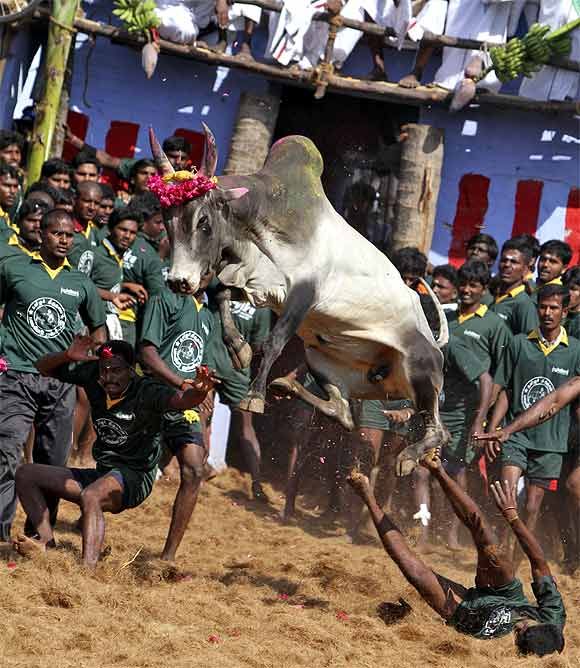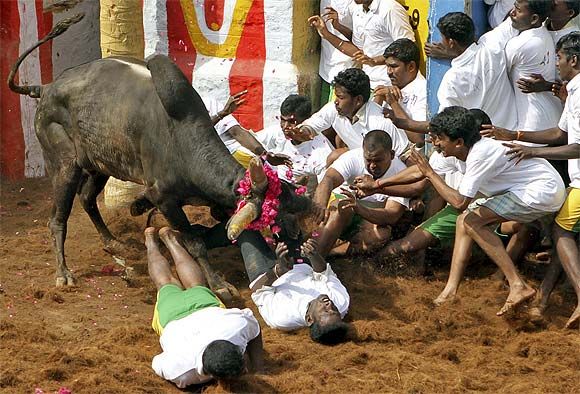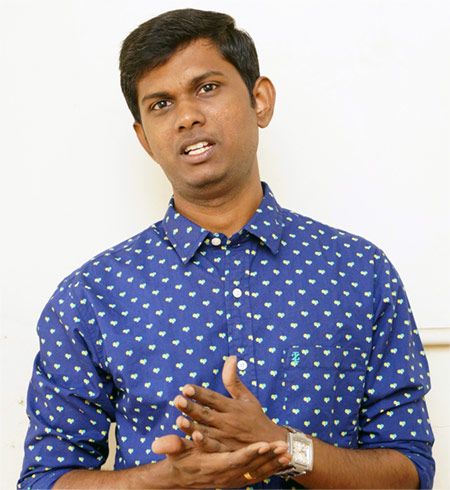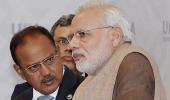'We need all the people who support Jallikattu to empathise with a poor, frightened, animal. Like racism and casteism, this is speciesism; discrimination based on species.'
'Human beings consider themselves superior and they consider it their right to exploit non-human beings, the animals.'

Niranjan Shanmuganathan may be a Tamil and his grandfather might have played Jallikattu years ago, but that was not a deterrent in him speaking out against Jallikattu, played mostly in Madurai and southern Tamil Nadu.
On seeing the way chickens were transported upside down on cycles and lambs dragged into butcher shops, Niranjan, left, below, became a vegetarian and a full fledged animal activist 12 years ago.
Niranjan -- who works in HR at an IT company and is actively involved in protecting animals -- tells Shobha Warrier/Rediff.com why people should not look at Jallikattu as a sport, and why it is extremely cruel to bulls.
The villagers who participate in Jallikattu and those who support it say that it is not entertainment, but a part of Tamil culture. Do you agree?
I am a Tamilian, and I also understand that Jallikattu is a part of our culture. There are so many things that were part of our culture, which we had to abolish, like Sati, child marriage, etc.
At that time, there was a lot of hue and cry saying those were part of our culture, but we had to change in the course of time.
It cannot be denied that there is cruelty in Jallikattu. A lot of NGOs have investigated this thoroughly and documented it. Even during the period of regulation, we saw a lot of cruelty.
Have you seen how the villagers treat these bulls?
I have assisted people who have gone to investigate Jallikattu and have seen how people train the bulls for the event. But I have not seen the bulls during the performance.
The argument put forth by the villagers is that the bulls are treated as part of the family. It is true that they are loved and fed very well, but the training itself is very cruel. They are hung on a pole and a group of people tease the bull to make it ferocious, that is bullying the bull.
They try to make the bull so ferocious by bullying that it becomes so ferocious that it attacks men. Just because they love the bull and give food, it does not give them the right to abuse it.
There is a huge crowd of people at Jallikattu and everyone wants to win the prize and you see a kind of mob violence there. The owner of the bull would never want to lose and he would do whatever he can to win.
In the chaos and the noise of the crowd, the lone bull gets so scared.
We need all the people who support Jallikattu to empathise with a poor, frightened, animal. Like racism and casteism, this is speciesism; discrimination based on species.
Human beings consider themselves superior and they consider it their right to exploit non-human beings, the animals.
I am from Tirunelveli and my grandfather used to play Jallikattu and he had shown me the scar on his hip.
How did your family react when you started campaigning against Jallikattu?
They told me that it's part of our culture and I should learn to accept it. Of course, it is part of our culture, but times are changing and today, you don't require a sport like this to entertain ourselves.
When there are many other traditional sports like Uriyadi which can be revived, why torture animals?
Also, when there are many other pressing issues to look into -- like how we are going to face the next monsoon -- political parties shouldn't be so involved in Jallikattu.

All the political parties without exception jumped into the fray and all of them condemned the ban on Jallikattu. Not a single political party came out in support of the animals. Do you feel they are using this as an issue to win some votes?
Definitely. It is a sensitive issue which everybody wants to use to their advantage and publicity. We have the election coming soon and it is sad that people are making use of this opportunity for their own benefit at the expense of poor bulls.
BJP MP Tarun Vijay tweeted that Jallikattu was part of Tamil tradition and should not be stopped. RSS ideologue S Gurumurthy had the same opinion. As a Tamilian, how do you react to these comments?
I understand when Jallikattu supporters speak about the issue, but I don't understand when people, who are not part of this, jump into the issue, dragging culture and tradition.
When the Supreme Court banned Jallikattu, many people here reportedly felt the ruling was against a Hindu tradition..
I don't agree with that. You should understand that the Supreme Court did not target only Jallikattu, but about the way animals are treated in many other states too. The ruling was targeted at all across India.
You will see that not only Hindus, but even churches celebrate Jallikattu. So, it's not just a Hindu tradition now, it's part of the harvest festival.
Though all farming communities celebrate Jallikattu, only Hindus celebrate Pongal.
 On television debates, those who spoke of Jallikattu as a part of Hindu culture, said that only 5 star activists who had no idea about Indian culture were talking against Jallikattu...
On television debates, those who spoke of Jallikattu as a part of Hindu culture, said that only 5 star activists who had no idea about Indian culture were talking against Jallikattu...
I am a Hindu and I am not a 5 star activist. You can't give such colour to animal activism. When we see that animals are treated cruelly, we don't look at who is doing it and what his religion is.
Our only concern is the sufferings of the animal.
Nobody should think that animal activists are targeting only Jallikattu, we are against using all animals as sport and entertainment.
Were you surprised that a party like the BJP, which was campaigning against cow slaughter, supported Jallikattu?
A lot of BJP supporters were shocked when Jallikattu was taken off from the notification. It was politicised.
You say Jallikattu is cruel. Is it also not cruel to pack hundreds of bulls in a truck and transport them to Kerala from Tamil Nadu to be slaughtered?
It is cruel, but two wrongs do not make a right. It is true that so many bulls are transported to Kerala to be slaughtered. Here, we are trying to stop them being used as entertainment.
Have you spoken to the villagers? Do they feel there is cruelty to bulls in Jallikattu?
I have spoken to many youngsters who have come to the cities while their families live back in the villages. They do agree that there is a lot of cruelty in Jallikattu. All the investigations have found that bulls are treated cruelly in Jallikattu.
Yes, it is difficult to convince the villagers, it will take time. We will not be able to do it overnight. I am hopeful that with education and time, people will change.
I am happy that with this, many people have started talking about animal rights.
Niranjan Shanmughanathan's photograph: Sreeram Selvraj











 © 2025
© 2025